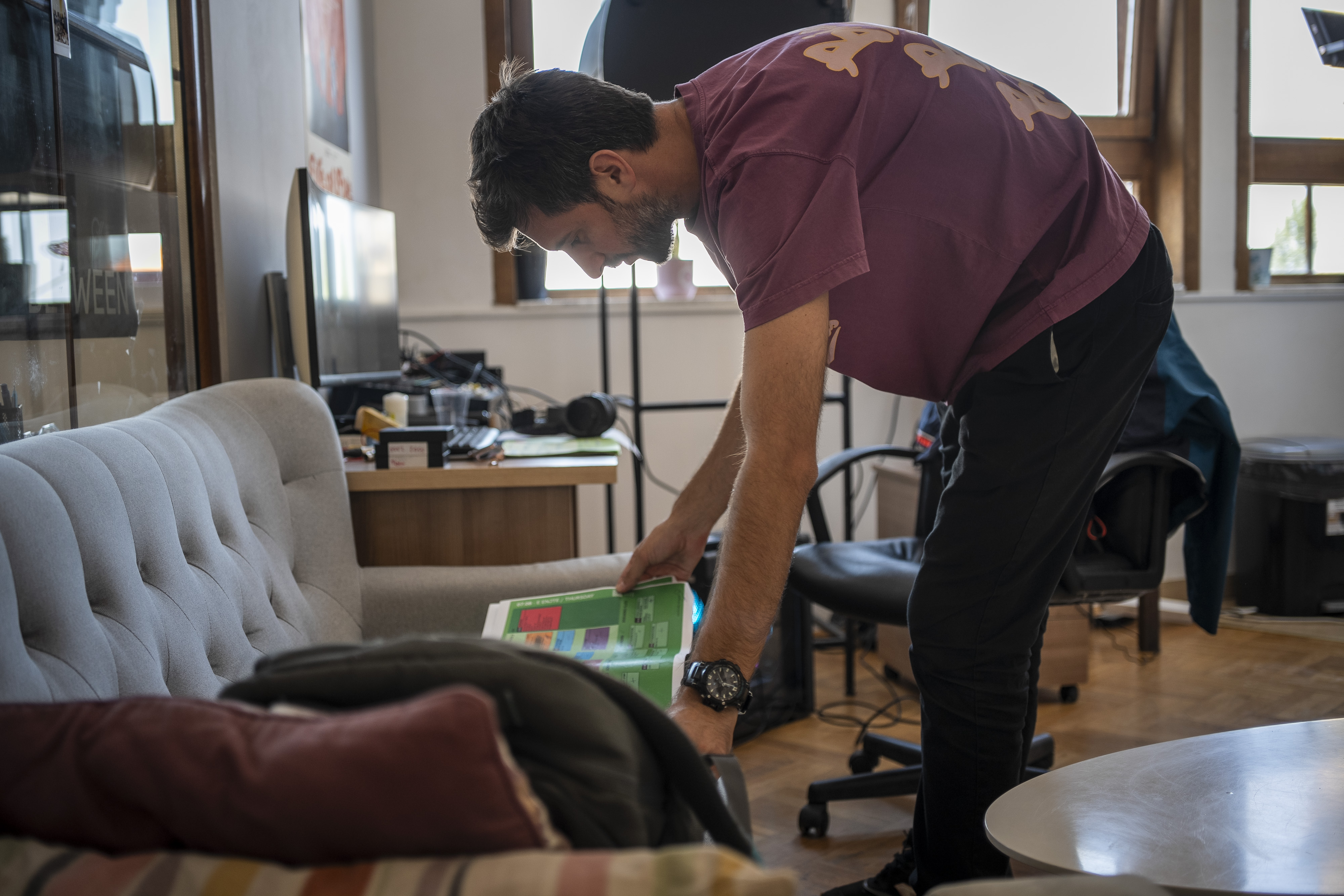Years ago, on summer evenings, Buron Karahoda and his friends would race along the narrow cobblestone streets of a neighborhood near the center of Prizren, an area bordering the streets of Medina, Farkëtarët, and Saraçët. Sounds and voices often echoed from a nearby courtyard, but the children could not see what was happening behind the wall that separated the Karahoda family’s house from the Lumbardhi cinema. The movies played in the open-air cinema, with only flickers of light catching their eyes.
Raised in an ordinary Prizren family, Karahoda remembers himself as a well-behaved child. The most daring thing he and his friends did was climb over the wall to sneak into the cinema courtyard, eager to satisfy their curiosity about the music, the dialogue, and the lights that lit up the night sky.
Back in 2010, Karahoda never imagined that the wall would later take on a metaphorical meaning; not only did it separate his home from the cinema, but also his childhood from his future. The cinema near his house would mark the beginning of a life lived along film.
Now, at 33, Karahoda is part of the team that organizes Dokufest, a Documentary and Short Film Festival, one of Kosovo’s main cultural events. Founded in 2002 by a small group of film enthusiasts, the festival has grown significantly over the years and has become one of the most important film gatherings in Southeast Europe. Today, Dokufest shapes both the cultural and economic life of Prizren, putting the city on the international cultural map and boosting tourism. The festival also keeps a close connection with the city’s public spaces, best expressed through its improvised cinemas in iconic locations, including the city’s riverbank and fortress.

Buron Karahoda is the main projectionist of Dokufest. Photo: Ferdi Limani / K2.0
The festival is not only closely connected to the city’s spaces but also to its people. Like many others, Karahoda began his journey at Dokufest as a volunteer shortly after finishing elementary school, about 17 years ago, and has gradually been promoted through various roles.
In the same neighborhood where he grew up, at the end of Saraçët Street, stands the “Xhemajl Berisha” Culture House, one of the spaces the festival uses every summer during its nine-day-long editions. Karahoda walks across the center’s carpet as if it were the grass in his own backyard. This is his third year coordinating Dokufest’s film projectionists. Like many other behind-the-scenes staff, he knows all the festival’s cinemas like the back of his hand.
Karahoda begins his work for the festival in July, when he receives the list of films selected for that year’s Dokufest.
“In the last three years, since I became a projectionist, I’ve tested all the films myself; in one edition, we show anywhere from 220 to 260 of them,” said Karahoda. He tests every film to ensure all elements function properly, including the sound, video, subtitles, file type, and other technical details, a process that takes about three weeks. Afterwards, he trains the volunteers who will assist him with film screenings across the festival’s cinemas, a process that lasts about two weeks.
Born and raised in Prizren, Karahoda says he can’t imagine what he would do with his life if Dokufest didn’t exist.

The Dokufest team tests every film they plan to show several times. Photo: Ferdi Limani / K2.0
“I grew up in this spirit, and I never had to think twice about it. Everyone in my circle, my community, and my neighborhood has worked with or been involved in Dokufest. I feel part of this achievement; the festival fulfills me,” he said as he climbed the narrow stairs leading to the projection room of the Big Cinema, as it’s called, an improvised theater hall used for screenings during the festival. From above, the large hall is visible only through a small rectangular window; the empty seats before the projector screen create a sense of grandeur and emptiness, like being by the sea with your eyes directed towards the horizon.
As soon as the film’s sound begins in the cinema, Karahoda walks down to the hall and sits in one of the many seats, examining the projection frame, subtitles, and dialogue. He focuses especially on the dialogue, since, as he explains, it should be loud enough to create a cinematic atmosphere but not so loud that it prevents the audience from following the film.
After a few minutes, the test ends. The film he tests explores the recent pandemic and the origins of the COVID-19 virus; the large, empty, dark hall creates feelings of loneliness and uncertainty, echoing memories of that period of isolation.
***
The traditional Ottoman fountain, the Shatërvan, marks the starting point of the alleys that branch through Prizren’s central neighborhood. Vigan Bytyçi knows one of these streets well; it connects the city center with the Marash mountain range. Born and raised in Prizren, he used to pass through it as a child on his way to his maternal grandmother’s apartment.
When Bytyçi was about 17, he and his family members had gathered at his grandmother’s, during which someone suggested that he volunteer at Dokufest. One relative quickly called a festival organiser to let them know that a member of the family wanted to help out. It turned out that the same day, teams of volunteers were cleaning the river of garbage.
“I crossed the street, climbed down and went straight to Eroll [Bilibani, head of DokuLab, Dokufest’s educational department], and that’s where I started,” Bytyçi said. “From there, they assigned me to Kino Lumbardhi as a volunteer, with Bahri Uka as my coordinator. The next year, they put me in charge of logistics, and later, I took over the festival’s entire logistics. From then until today, I’ve been here.” Like Karahoda, Bytyçi had no idea what role Dokufest would come to play in his life.
Bytyçi is a man who finds it difficult to sit still; he gives off the impression that he is the kind of person who could solve any problem. When he sits at a table, he is perched on the edge of his chair, like he is always on the go. His skin is tanned by the sun, and during Dokufest, he can be found everywhere. It is easy to imagine that he was an active child.

Vigan Bytyçi, the main person behind the scenes at Dokufest. Photo: Ferdi Limani / K2.0
“I don’t leave a single stone unturned; that is how I am described by my parents and others,” he said.
To engage fully in Dokufest, Bytyçi had to navigate other professional expectations and ambitions. He studied at the Faculty of Law, and because his parents were lawyers, the plan was that, after finishing his studies, the three of them would work together in the same profession.
“But this idea did not fulfill me. I have always enjoyed hands-on work; I can’t spend 7–8 hours at a computer in an office without moving,” he said.
As a child, he was passionate about basketball, a sport he considers his first love. He played with Prizren’s junior team, then with the seniors, and later became a coach for the children’s teams.
During this time, he also worked for Dokufest. Passion alone wasn’t enough for Bytyçi to pursue basketball professionally — sports remain an uncertain career path in Kosovo. Eventually, he had to choose between the two.
“We had training during the day from 11:00 to 13:00, then from 16:00 to 17:00, and again from 19:00 to 20:00. I could easily manage the evening sessions, but the others were a real challenge,” said Bytyçi. “After a period of juggling both jobs, I quit basketball.”
With 17 years of experience at Dokufest, he now serves as the logistics coordinator, overseeing the construction of the cinemas and managing all aspects of the festival’s spaces.
Bytyçi has long memories of Dokufest. He recalls that in the festival’s early years, the work was much harder, as they had limited resources and the various improvisations required a great deal of effort. At its beginnings, the organization was modest; even the main people helping the staff to run the festival were volunteers.

Bytyçi and his team oversee everything related to the festival’s stages. Photo: Ferdi Limani / K2.0
“We did a lot of physical work in the past. For example, the cinema we built in the fortress covered over 300 square meters. We had to carry all the boards and materials ourselves,” he said. “And for about 7-8 years, this work has now been carried out by a contractor; with the festival’s progress, we have other people who deal with that; it’s more about care and logistics rather than physical work.”
The construction of the film and concert stage in the Prizren Fortress began in 2010, as part of the festival’s effort to create special spaces that connect contemporary art with heritage. The fortress sits atop a hill above the city, a strategic location but one with challenges to access due to its narrow and steep roads.
Building the stage at this location required extensive organizational effort. Despite the challenges, the fortress offers a full panorama of the city and creates a unique atmosphere for both the audience and the artists. The fortress space has become one of Dokufest’s most important venues, blending natural beauty and history with the festival’s cultural events. Bytyçi has been involved in constructing this stage from its very beginning. He has taken a similar role for another improvised cinema, the one built on the bed of the Lumbardhi River, a cinema which has been constructed annually since 2009 and has become one of Dokufest’s signature cinemas during the festival.
As he speaks, his phone vibrates. The day before, heavy rain had raised the river’s water level, putting pressure on the wooden structure of the cinema. Someone called to inform him that the structure had been inspected and everything was in order.
“I have to deal with this kind of stuff all day long during Dokufest. If a cable doesn’t work somewhere, I have to go and change it,” he said.
Bytyçi recalls how, in the early years, the festival’s equipment and other necessary materials were stored in a warehouse in the former tobacco factory, alongside the old equipment from the former factory.

Bytyçi’s work doesn’t end when the festival does. Photo: Ferdi Limani / K2.0
“We now have a 400-square-meter basement that holds all the equipment, and it’s good infrastructure. Equipment arrives by truck, tractor, or cart — we have everything stored there,” he says.
Like Karahoda, Bytyçi is involved in Dokufest year-round, working on various projects during the months outside the festival.
Preparation for each new edition begins around March, when Bytyçi ensures the festival secures all necessary permits from the municipality to use the city’s spaces during the nine-day event. By mid-July, he and his teams enter an intense two-week period, erecting the structures for all the improvised cinemas and handling every other logistical and organizational element.
This year, Bytyçi and his team built a new cinema stage that has not appeared in previous editions — Kino Oborri — a replacement for Kino Lumbardhi, which is temporarily closed for renovation. The cinema’s name reflects its construction in a courtyard that Dokufest has borrowed for the duration of the festival.
For all the cinemas and other festival spaces, some of which have become traditional venues, the teams carry everything themselves, including seats, projectors, lights, cables of all types, and all other necessary materials and equipment. One of the most important tasks is constructing the projector frames, which Bytyçi calls “golla.”
“Everything related to the construction is my responsibility, including transportation to all locations. We go to the fortress by tractor,” said Bytyçi, referring to the location Dokufest uses inside the Prizren Fortress. This year, that stage held concerts during the festival’s evenings, known as DokuNights. He remembers the emotions the road to the fortress triggers from when he was younger.
“I sat on the tractor to the fortress when I was very young, when we brought the materials. The first time it seemed, wow. Now I go there with my eyes closed,” he said.

Dokufest is one of the main cultural events in Kosovo. Photo: Ferdi Limani / K2.0
Although organizing the festival and managing it during its days is challenging, Bytyçi says the hardest part comes after the festival ends. While the workers’ enthusiasm wanes and everyone starts planning their vacations, everything that is distributed across the eight cinemas and other spaces must be collected.
“People are exhausted; they just want to leave. I end up handling things for a week. Everyone wants to finish their work and go,” he said.
The void of the days after
On August 11, the first Monday after the festival closed, only the workers remained in the Dokufest spaces. For them, the end of an edition, the result of a year of planning and effort, comes a little later.
On the left side of the alley beyond the Stone Bridge stands the Lumbardhi Cinema, which, due to renovations, was not a venue for this year’s edition of the festival. The long doors that Dokufest guests once stared at while waiting for films have been replaced with construction equipment. Yet the building still asserts its presence, as if to say it will return soon to restore the splendor that the other cinemas have taken.
A few meters away, at the House of Culture, the buzz of people arriving for films has been replaced by the sharp noise of a vacuum cleaner as staff clean the spaces. Bytyçi and his team were already loading a refrigerator onto a pickup truck borrowed from the Prizren municipality. They had been working since the morning, collecting items from all locations and returning them to the Dokukino premises, where the Dokufest offices are also located.
Inside, almost no one has remained. The few workers still cleaning exchanged the occasional necessary words. Cables and various equipment lay scattered across the floor, and the workers move through them in a completely ordinary, almost carefree manner. The movie posters hanging on the walls suggest that the festival’s liveliness would once again return. As happens every year, the organizers begin thinking about the next edition during the festival itself, while actual work starts again after they have returned from vacation.
Bytyçi and Karahoda were already together, coordinating their work for the day. The heat scorched the city. In the large cinema, where Karahoda had screened a film just a few days earlier, the drawn curtains seemed to have reclaimed the space from the projector’s light; the stage had once again become a theatre. Sunlight spilling from outside touched only a few of the red seats near the door, while the other seats blended into the darkness. A poster with the word “VOID” — part of this year’s Dokufest theme — remained stuck to the building’s windows.
Feature image: Ferdi Limani / K2.0
 Want to support our journalism? Become a member of HIVE or consider making a donation. Learn more here.
Want to support our journalism? Become a member of HIVE or consider making a donation. Learn more here.







